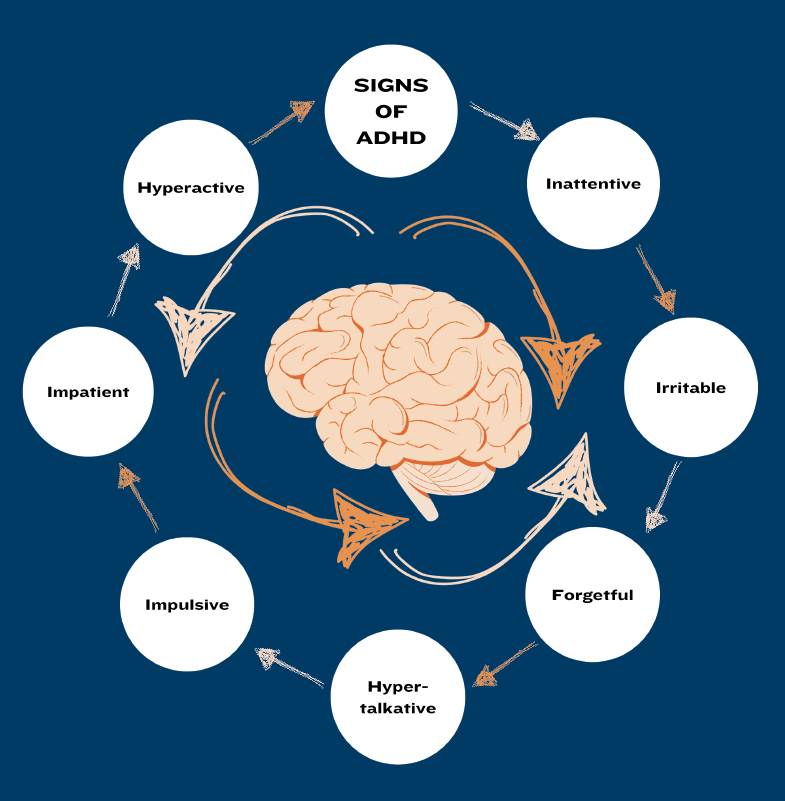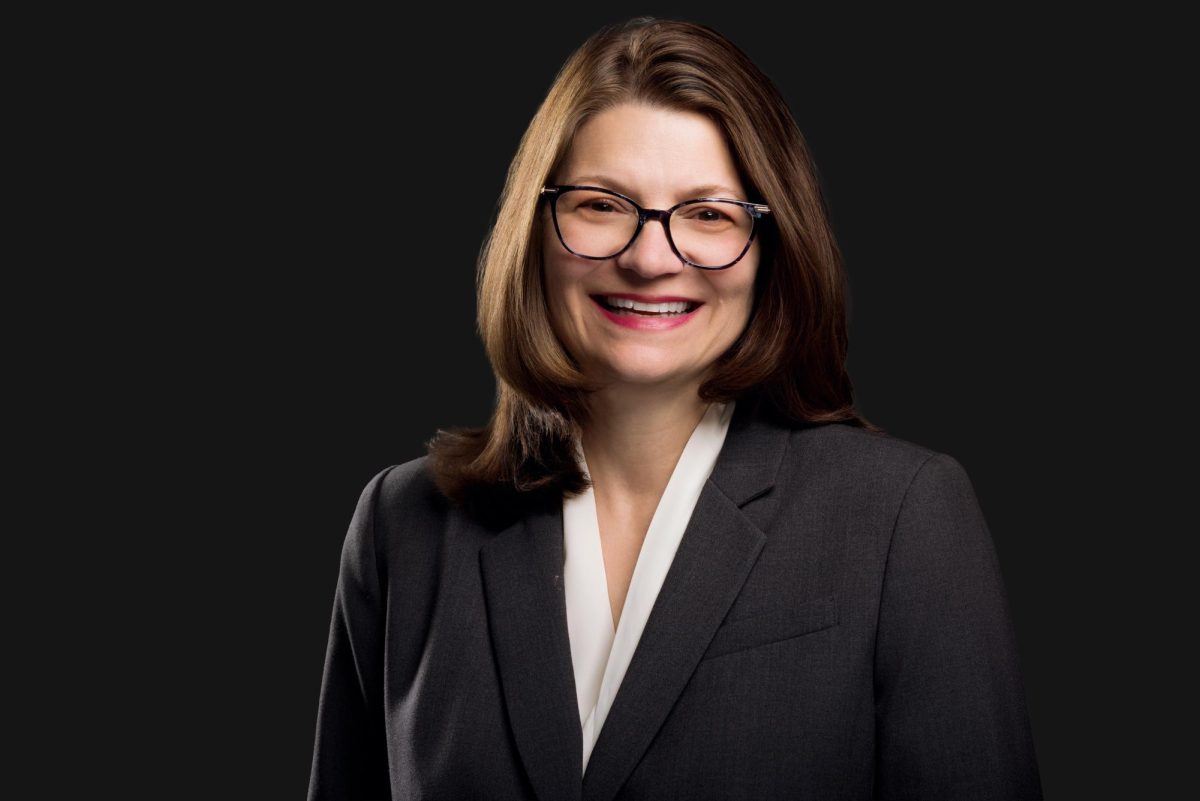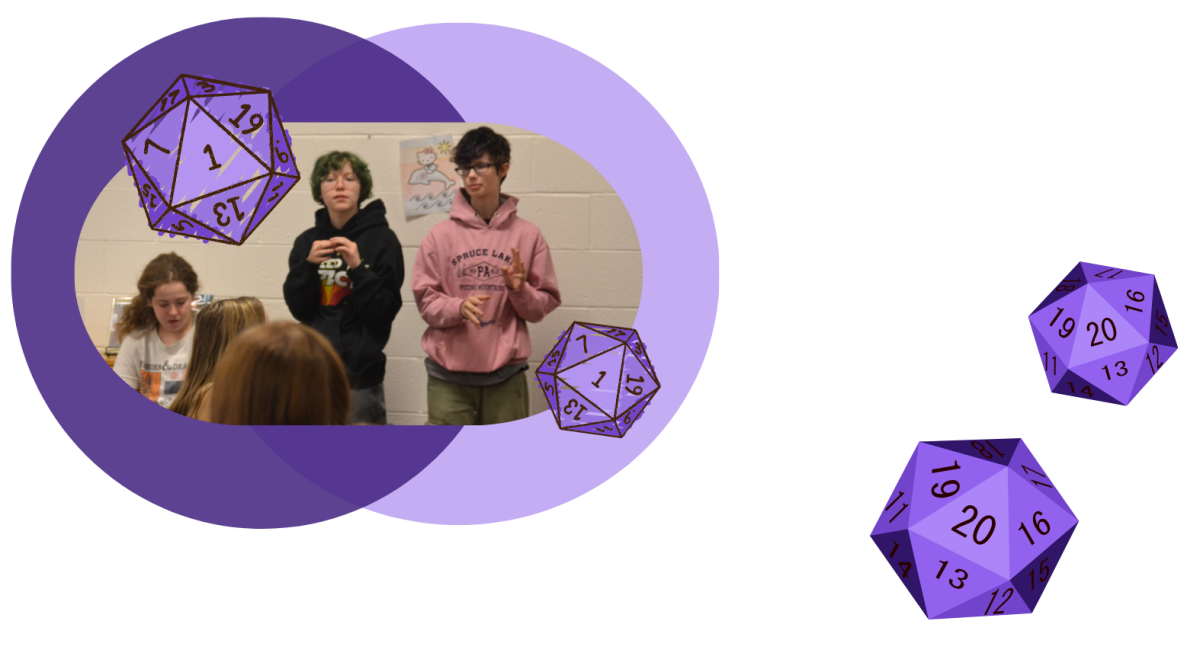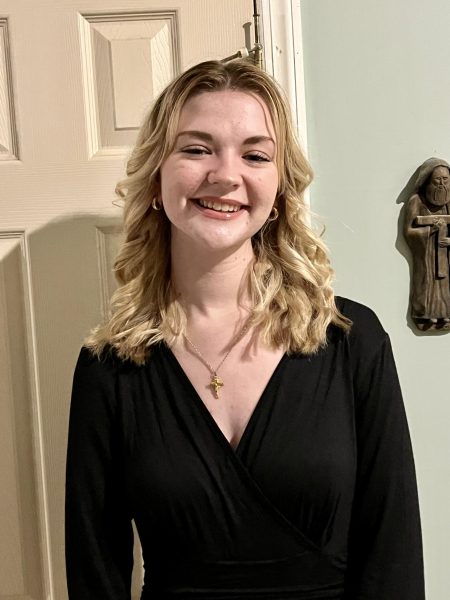This previously ran in our October 2023 print issue.
“I think it’s important as a teacher to let those kids know, aside from what they may believe, that they’re just as capable as anybody else,” Emmaus High School chemistry teacher Brian Harkness said.
Harkness was not diagnosed with ADHD until his mid 40s, but he believes life may have looked different for him had he been diagnosed sooner.
“It would have allowed me to not make some of the mistakes I made because my brain is so scattered,” Harkness said.
The CDC reports that nearly 6 million people are diagnosed with ADHD each year — and the adults and students of Emmaus are no exception.
Attention-deficit hyperactivity disorder (ADHD) is a mental health condition that affects a person’s ability to pay attention and causes them to act impulsively and struggle with hyperactivity. The National Institute of Mental Health reports that most people with ADHD receive a diagnosis during their early elementary school years — though that is not the case for everyone.
Senior Katie Kibrik has ADHD, but was not formally diagnosed by a psychiatrist until her teenage years.
“I found out [in the] beginning of freshman year,” Kibrik said. “I always thought I had it.”
Kibrik recognized her symptoms by researching the topic and by listening to the professional opinion of her mother, an occupational therapist. Her inability to focus and being hyper-talkative, presented the conclusion that she had ADHD. ADHD affected her attention span, which caused issues in many aspects of her life.
“I have a really hard time holding conversations, and paying attention in class, and paying attention at the dance studio,” Kibrik said.
In some cases, ADHD is mistaken for bad behavior or a learning disorder due to the academic, social, and emotional struggles many children and teenagers with ADHD face. While a child or a teenager with ADHD may be on the same academic level as another student without it, tasks like focusing, remembering to get work done, and sitting still are much more difficult. Managing schoolwork is a common struggle for high school students with ADHD.
Additionally, ADHD is frequently comorbid (meaning combined) with a number of other mental health conditions, including autism spectrum disorder (ASD), obsessive-compulsive disorder (OCD), bipolar disorder and other depressive disorders, tic disorders (such as Tourette’s syndrome), learning disorders, anxiety disorders, and oppositional defiant disorder (ODD). In fact, according to the National Library of Medicine, 60-100 percent of people with ADHD will be diagnosed with another comorbid condition, making living with the disorder even more challenging.
Kibrik struggles with the symptoms of ADHD, especially once they are paired with symptoms of other conditions.
“There’s a lot of guilt and embarrassment that comes with the symptoms of ADHD, especially when it’s combined with anxiety or combined with depression,” Kibrik said. “It can kind of feed off each other.”
Possessing both ADHD and other conditions can make for stronger, worse, and more defined symptoms that can be misinterpreted for other disorders.
ADHD is also commonly mistaken for the other conditions with which it is combined. Misdiagnosis can be a frustrating and challenging situation, as it does not allow individuals living with ADHD to receive the proper treatment for their disorder. Others may not be diagnosed at all because their symptoms are not “typical” or they are unable to receive proper medical care due to insurance or financial reasons.
A missed diagnosis of ADHD for those who have it can lead to other issues, such as a lack of classroom accommodations for students, no medication when necessary, low self esteem, and other mental health issues that continue into adulthood.
“For a lot of people with ADHD, it can lead to embarrassment and tension within relationships,” Kibrik says. “And just like a feeling of self deprecation when it comes to your self image.”
Poor self image is a daily struggle for those affected by ADHD. The constant criticism received by adolescents with ADHD affects them, and continues to affect them through adulthood. Kibrik faces many pressures as a teen with ADHD. The fear of being labeled as lazy, forgetful, or annoying is a constant stressor for individuals with ADHD. Though there are many insecurities that come with being a teenager, there are even more that come with ADHD.
“A lot of women with ADHD are known to struggle with depression and anxiety. Especially in your teen years because other people’s views of you are so important at this age,” Kibrik said.
Women with ADHD, such as Kibrik, can face poor self image and inadequate attention span, along with other symptoms that present differently in males.
According to Healthline, a health-based website and organization, ADHD is also three times more likely to be diagnosed in boys than girls. Symptoms vary in both sexes, and while boys are more likely to show stereotypical external symptoms such as hyperactivity and impulsivity, girls are more likely to present with internal symptoms, such as difficulty paying attention and sustaining focus. Symptoms of ADHD in girls are often much more subtle, and harder to identify. As girls with ADHD typically present with fewer behavioral problems than boys, their less-noticeable symptoms are often overlooked.
Having taught both male and female students with ADHD, Harkness agrees with Healthline’s assessment.
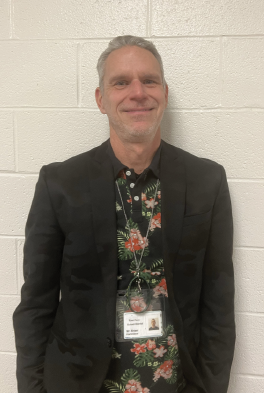
“I agree that girls tend to be misdiagnosed, because we almost think it’s rambunctious boy behavior. I think it’s classed by sex, and I don’t necessarily think that’s appropriate,” Harkness said.
Regardless of gender, ADHD is a lifelong condition. However, it can be treated with the use of medication and behavioral or cognitive therapy to manage the symptoms. According to a national parent survey from 2016, 77 percent of children 2-17 years old were receiving treatment for ADHD, and of this percentage, 32 percent were being treated with both cognitive therapy and medication treatment.
However, the side effects of medications used for ADHD can be an additional challenge. Medications such as Ritalin have side effects that can be severe and cause symptoms such as migraines, insomnia, loss of appetite, nausea, and nervousness. In addition to the symptoms, mental health medications are also difficult to provide, as the medications used for one individual may not work for another.
Last year, the Food and Drug Administration (FDA) announced a shortage of the popular drug Adderall which is used to treat ADHD. This shortage affects more than the basic ADHD symptoms; it affects most aspects of life with ADHD. This includes increased restlessness and decreased attention span. Patients with ADHD have described the effect of taking their medication as feeling more alert, awake, and more in control of their emotions. The shortage affected all of these variables, making it hard for people with ADHD to do even the simplest of daily tasks.
The individuals that take medication for comorbid conditions face side effects that impact their ability to function. Individuals diagnosed with ADHD are often more susceptible to other conditions. If an individual is taking a series of medications, then the medications can negatively interact with each other. For example, if an individual is taking Ritalin (methylphenidate), while taking a drug used to treat Depression, such as Lexapro (escitalopram), they could experience moderate to severe drug interactions, causing increased side effects. The interactions between the two would also make them more vulnerable to a rare condition called Serotonin Syndrome, which can cause seizures, extreme changes in blood pressure, and hallucinations.
Other than medication and therapy, schools can also accommodate students with ADHD.
Kibrik receives accommodations from Emmaus High School and the staff members. The staff members care for her ADHD and are constantly working to lend a helping hand. She utilizes the counseling office, a place where individuals with ADHD can visit if they are having trouble focusing.
“Most of my teachers have been very understanding about it,” Kibrik shares. “I’m grateful to have teachers who are accommodating.”
A survey done in 2014 by the CDC states that nine in 10 of children ages 4-17 diagnosed with ADHD receive some type of school support – such as classroom accommodations, including Individualized Education Plans (IEPs) and 504 plans.
Kibrik sometimes forgets about homework, tests, and deadlines due to her ADHD, but her teachers are understanding.
“At school, there’s just a lot of stress that comes with the anxiety of not knowing if you forgot something,” Kibrik said.
Though school is still a struggle due to ADHD, Kibrik gives her best efforts. However, she worries that these struggles affect the way that her teachers view her.
“It could come off as being lazy or irresponsible, but I’m actually trying very hard,” Kibrik said. “It’s just that I have some setbacks.”

Since she is easily distracted by noise, Kibrik has the opportunity to take tests in the Learning Lab for a less-distracting environment. Her teachers also allow her to have a few deadline extensions when necessary. Although she does well in school, she has factors working against her.
While living with ADHD can be consistently difficult, people with the condition are not alone. The ADHD Awareness Month Organization combats false and harmful stereotypes through ADHD Awareness Month, which has been recognized in October since 2004. The members of the (ADHD Awareness Month Organization,) an organization that selects the theme for the month and promotes the ideas, include the ADHD Coaches Organization (ACO), the Attention Deficit Disorder Association (ADDA), and Children and Adults with Attention-Deficit/Hyperactivity Disorder (CHADD). Since the month is recognized annually, there are positive and helpful ways to understand, accept, and treat ADHD being promoted.
The theme of this year’s ADHD awareness month is “Moving Forward with ADHD.”
Getting diagnosed with ADHD can be a frightening thing to undergo. Some may feel helpless in thinking that it is a limiting factor and that the goals they set may now be out of reach. The theme this year is centered around moving forward with the diagnosis, and the realization that just because someone has ADHD, it does not mean they are any less capable than others without it.
Harkness shares some of the tools he has used over the years to help manage his ADHD.
“[I design] different ways of working around the chaos that’s in my head, like having systems in place,” Harkness said. “I’m a list maker now, and it makes me feel better about my day too because I can cross off stuff that I’ve done.”
Many of the coping mechanisms for ADHD include visual reminders. Visual cues, such as post-it notes on a door or keeping the task in eyeshot, are helpful ways to keep the task in your brain. For students, utilizing a planner can help to keep school work and due dates organized.
Kibrik believes that her support system has helped her cope with her ADHD, and the social drama that may come along with it. Her mother, an occupational therapist, has extensive knowledge of ADHD, making it easier for her to understand Kibrik’s condition.
“She is very knowledgeable about psychology, and she has really been my main support system and the person that I can go to when I’m feeling frustrated with myself or need help,” Kibrik said.
Along with her mother’s support, Kibrik also receives support from her friends, some of whom also have ADHD.
“I also have wonderful friends who like me for who I am and don’t think that I need to change,” Kibrik said.
Adding supportive people into your life is a major aid to individuals with ADHD. Social situations, specifically those in teenage years, can be difficult to navigate for anyone, especially those with ADHD. With ADHD, it can be hard not to act on impulsive ideas and speak untrue thoughts that come to mind. Kibrik shares her focus after overcoming internal and external struggles that are caused by ADHD and how others react poorly to her symptoms.
“I really focused on school because even if someone was mean to me, they’re not gonna stop my success or my working hard,” Kibrik said.


